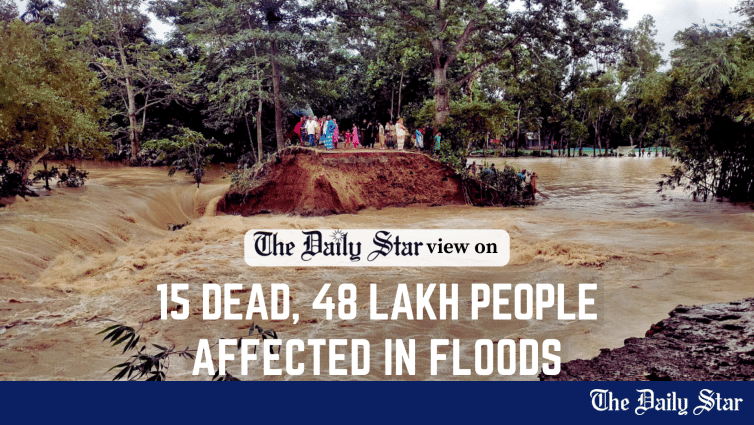Protesters in Bangladesh demand fair share of water from common rivers with India
Staff Correspondent 24 August, 2024, 01:26
The Save the River Movement forms a human chain, protesting at India’s aggressive water diplomacy, in front of the National Press Club in the capital on Friday. | New Age photo
Students and different organisations in Dhaka held demonstrations on Friday demanding fair share of water of the common rivers with India.
The demonstrations were held amid the deterioration of flood situation in the north-eastern districts due to onrush of water from India, the protesters alleged.
On the Dhaka University campus, students under the banner of Inqilab Mancha held a procession protesting against India, alleging that because they opened the Dumbur dam in Tripura the flood situation in Bangladesh aggravated, Dhaka University correspondent reported.
Protesters demanded removal of all the ‘illegal’ and unilateral dams by India on international rivers.
Sharif Islam Bin Hadi, the spokesperson of the Inqilab Mancha, said, ‘India released water in the night to kill people of Bangladesh violating diplomatic protocols.’
He announced that they would conduct a long march with ten trucks from Shahbagh towards Cumilla and the Dumbur dam on Tuesday.
Besides, students under the platform of ‘Baishammyabirodhi Sammilita Bishwabiddyalay Theatre Jote’ organised a rally in front of the arts faculty building Kala Bhaban protesting at the alleged opening of the Dumbur dam and India’s water invasion.
Meanwhile, students of Jahangirnagar University staged a demonstration on the campus blaming India for the flash floods in Bangladesh, university correspondent reported.
They brought out a procession from the university’s central Shaheed Minar and held a rally in the Battola area on the campus.
The speakers at the rally sought speedy diplomatic action from Dhaka to ensure that India fully follows the existing water-sharing agreements and also emphasised actions to mitigate the damages suffered by the flood-affected regions.
‘Dhaka should raise its voice against India’s policy of aggression that has thrown millions of people into danger. India is using the water at their reservoirs as a weapon to kill Bangladeshis,’ said Zahir Faisal at the rally.
Water security and climate related platform ‘Save The River Movement’ held a rally in front of the National Press Club, protesting at India’s water invasion of Bangladesh.
The participants of the rally demanded equal distribution of water of all trans-boundary rivers according to the international laws.
Political party Khelafat Majlish and banned extremist outfit Hizb ut-Tahrir also brought out separate processions in Paltan areas after Friday prayers in the afternoon protesting at India’s alleged water invasion.
A greater part of Bangladesh, including Feni, Cumilla, Noakhali and Chattogram, has been inundated due to relentless rainfall and onrush of water from the upstream leading to a rise in the water level of rivers, leaving 15 people dead and over 48 lakh people affected as of Friday evening.






